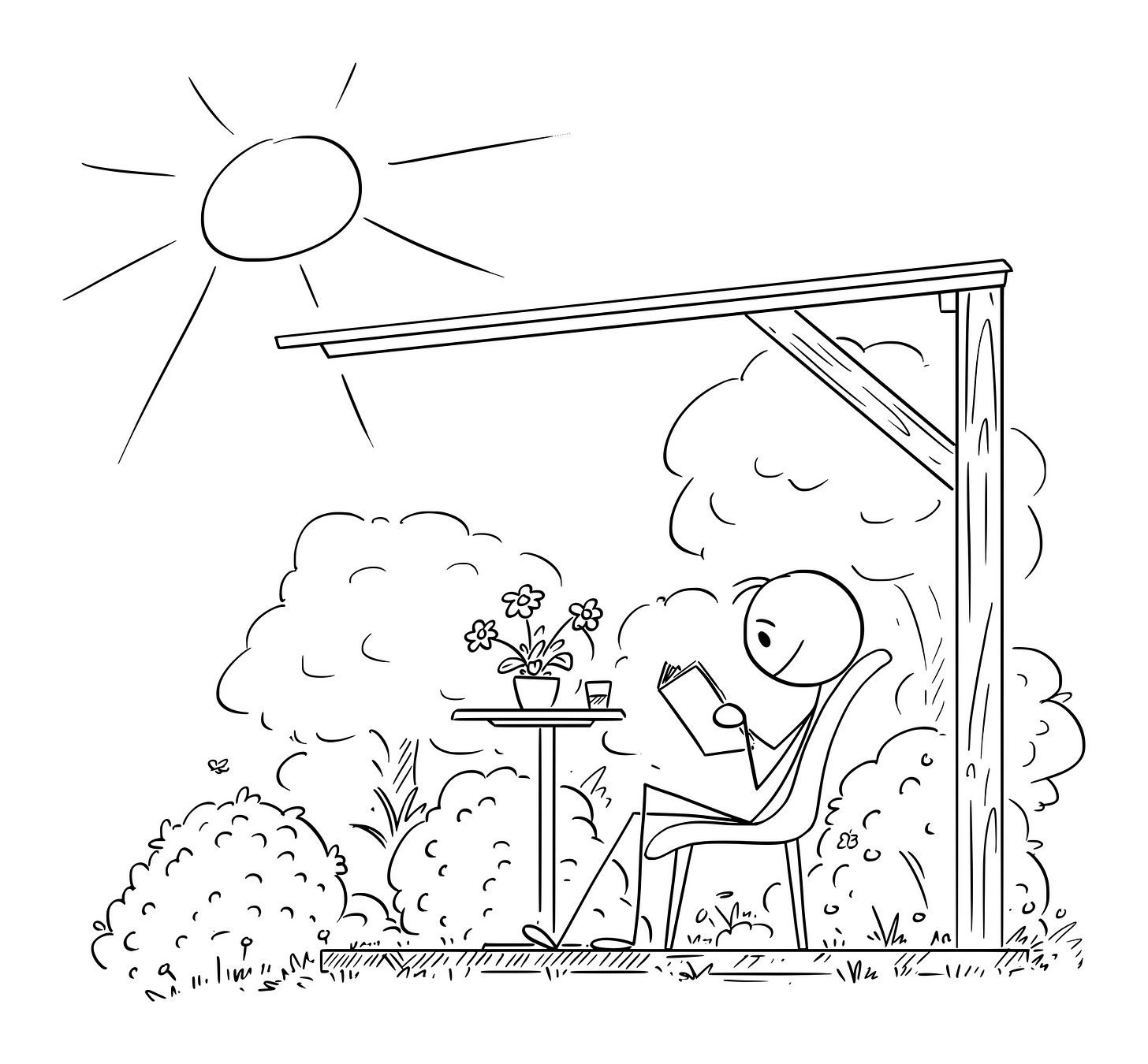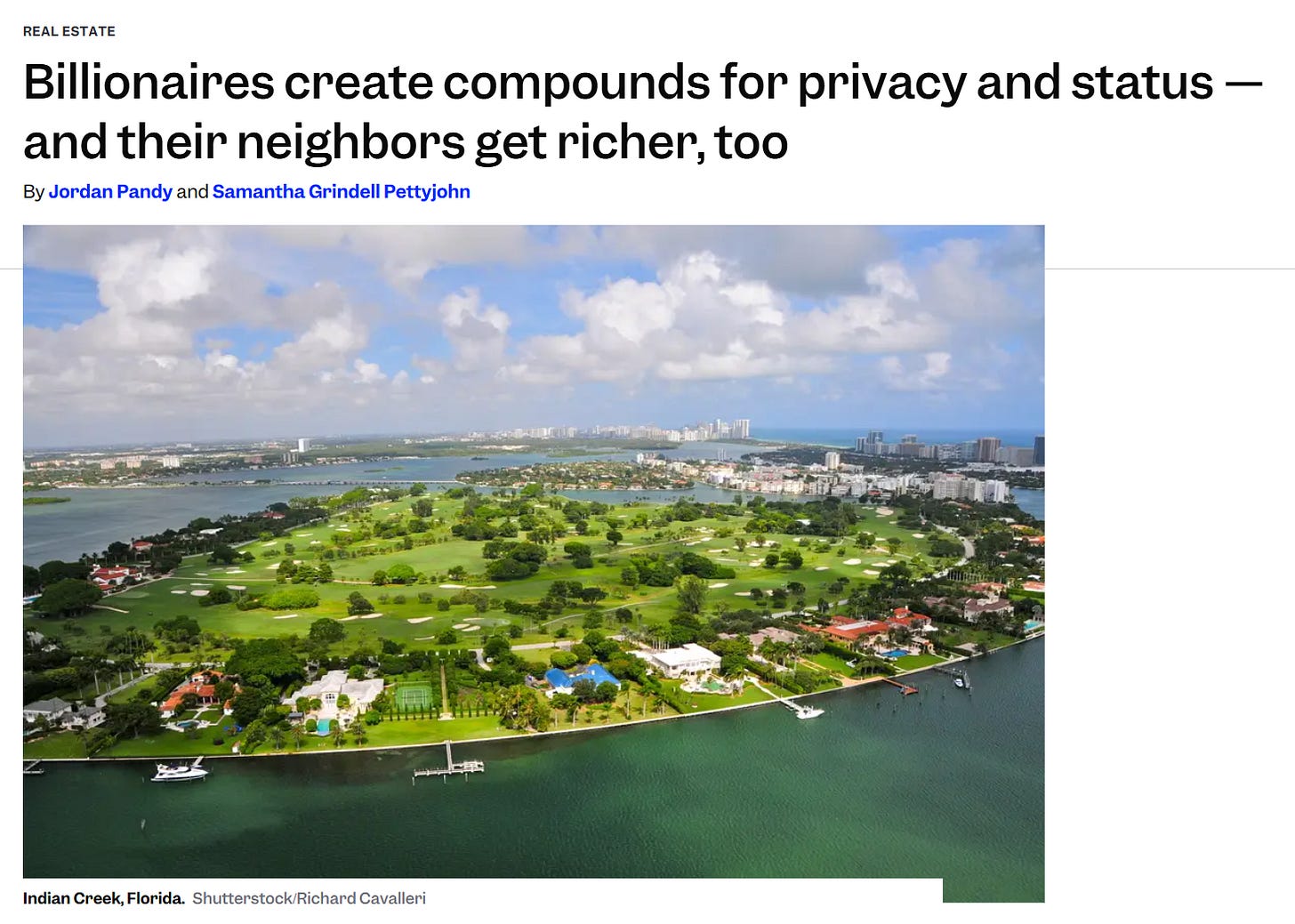I think I’ve told this story before, but it’s a useful one, so here goes again. My early-to-mid 20s-era girlfriend was from the northern section of a seaside town here in Connecticut. Her parents, who were affluent but not rich, lived in a lovely little house by a lake. Just prior to my meeting her, her parents and three other families that lived in their “neighborhood” had thrown some money together and purchased a nearby vacant lot; they treated it as a kind of park, splitting the landscaping duties, doing some gardening, putting up a gazebo and some picnic tables. As you can imagine, lakeside property in lovely little New England towns tends to be clustered quite tightly together, and the families felt that another house and family would make the area too cramped, noisy, and otherwise unpleasant. They had the means to buy the plot together, so they did. And I’ll tell you, the little park they built was really quite lovely.
So: was that NIMBY behavior?
I’ve brought this scenario up many times, and I’m always surprised by the number of people who say that, yes, this is NIMBYism. Surprised because the entire point of the YIMBY critique is that NIMBYs leverage zoning and regulation to inappropriately prevent new development and preserve existing housing conditions near their homes. The families that bought the plot together didn’t do anything like that. There were other bidders on the plot; the families simply outbid them. They engaged in perfectly ordinary house-buying behavior that did not depend in any real way on misusing zoning and regulations. (Indeed, the standard YIMBY line is that zoning and regulation drive up the cost of land unnaturally, meaning that their effort to buy the lot was made more difficult by the financial influence of zoning and regulation, not less.) Nothing legally prevented a developer from outbidding the families. This scenario could have played out in the exact same way in the libertarian paradise of a Matt Yglesias dream. No zoning shenanigans required.
And, indeed, I think the immediate question to ask of those who see NIMBY motives in this behavior is, what if it was just one property with a bigger lot? Suppose that, instead of the actual scenario, that extra land was attached to the lot of one of the nearby homes. Further suppose that someone bought that house and the attached land at a premium precisely because they wanted to keep that portion of land open based on the exact same motives, to prevent crowding and noise and traffic issues etc. Surely that couldn’t be NIMBY behavior, right? Does NIMBYism really include going on the free market and buying big lots to enjoy the benefits of space, privacy, and quiet - that is to say, the benefits of limiting your neighbors? If so, then essentially everyone who’s bought a house on a sufficiently-large piece of land is a NIMBY, with no zoning manipulation to speak of, and that doesn’t seem right, does it? And yet I have some sympathy for those who’ve told me that pooling money together to keep a lot unoccupied is “spiritually NIMBY” or similar. After all, it’s a play to preserve a neighborhood’s character by making it impossible to develop new housing. It just happens to utilize a different mechanism than the ones available to most local populations.
The obvious step here would be to recognize that there’s nothing special about the use of zoning and regulation to preserve a given neighborhood’s preexisting conditions. That behavior, as lamentable as the consequences can be, is just a different method for exerting the kind of control the rich exercise on the local environment as a matter of course. Indeed, the only thing that makes NIMBYism notable is that it grants the ability to block new construction to ordinary people with ordinary wealth; usually, that ability is reserved for the wealthy. After all, the truly rich routinely purchase nearby properties and land with the express purpose of keeping other people out, which absolutely excludes potential new buyers, sucks up potential stock, and drives up housing costs. Why would that not engender the same kind of anger as achieving a similar outcome with zoning and local control? It’s hard not to conclude that the reason is because in the US of A we venerate the wealthy and aspire to be them rather than blaming them for bad behavior. More to the point, though, there’s the fact that the YIMBY movement is a neoliberal movement - I’m sorry, it just is, it always was - and neoliberals worship the market and the affluence that the market creates. So they don’t have a problem with “market” behaviors that are undertaken for the same purpose and have the same effect as NIMBY behaviors. They just don’t like it when ordinary people use government to gain some slice of the leverage the wealthy enjoy.
We could in fact go a step further and ask about the numerator rather than the denominator, that is, ask about the income side of the housing affordability question rather than fixate only on the prices side. “Why don’t ordinary people have enough money to afford houses?” seems like a question that’s even more sensible than “Why do houses cost so much that ordinary people can’t afford them?” Yet to ask that question around YIMBYs is to receive endless sighing and complaints about changing the subject or not focusing on what really matters or distracting from the NIMBY scourge…. Again, it’s not hard to fathom why the average neoliberal doesn’t want to ask why Americans don’t make enough money to afford to buy their own homes; it was precisely the neoliberal policy revolution from the mid-1970s onward that resulted in a half-century of wage stagnation. It’s neoliberal influences in politics that keep us from enacting appropriately redistributive tax-and-transfer policies to help claw back some of the financial gains of the contemporary era for ordinary people. So of course they’d prefer to talk about the evils of regulation; it diverts attention away from the consequences of building a winner-take-all society. That YIMBY anger flows towards zoning and regulation - that is, public policy - for granting ordinary people the same incumbency power that the rich already enjoy is just a little poetic grace note.
To really look at the policy environment might force us to admit that absolutely everything NIMBYs are doing - maximizing the value of what is the only meaningful asset for vast numbers of Americans, in a policy environment and cultural context that relentlessly pushes them towards homeownership as the fulfillment of the American dream, as well as trying to preserve the things they like about where they live - is rational, even as we recognize how that behavior is destructive. And there again you’re left in a scenario which should prompt anger at elites and the game they’ve rigged, not ordinary people reacting predictably to the bad incentives around them, and we can’t have that. As a big ol’ lefty who actively disdains “the market,” I’m under no obligation to pretend that the rich buying giant lots and enjoying the peace and quiet enabled by long driveways and big manors is somehow more legitimate than NIMBY behavior. And I am free to ask why exactly we’ve created a society that’s so geared towards enriching a tiny few that the entirely ordinary goal of owning a home has become impossible - and in doing so I get to consider the whole damn show, not just the eeeevils of regulation and selfishness of ordinary people. You see, when I give food to the poor, they call me a saint. When I ask why the poor have no food, they call me a communist. And when I ask why ordinary people have no money to buy houses, they call me a NIMBY.
.png)





